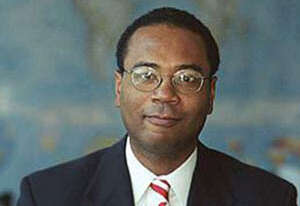Hubbard Radio Washington DC, LLC. All rights reserved. This website is not intended for users located within the European Economic Area.
What the president’s new order on race training means for federal contractors
The controversial White House directive banning what the Trump administration thinks is divisive diversity training - it applies to federal contractors, too.
Best listening experience is on Chrome, Firefox or Safari. Subscribe to Federal Drive’s daily audio interviews on Apple Podcasts or PodcastOne.
The controversial White House directive banning what the Trump administration thinks is divisive diversity training – it applies to federal contractors, too, adding to a heap of concerns that cloud the new fiscal year. For one take, Federal Drive with Tom Temin turned to the President and CEO of the Professional Services Council David Berteau.
Interview transcript:
Tom Temin: And except for reporting by our own Jared Serbu, most everyone overlooked the fact that buried in that second round of memos was the fact that that kind of training that the White House doesn’t like is also banned at federal contractors. So that’s a big issue, I guess, around town now, isn’t it?
David Berteau: It is Tom, and kudos to Federal News Network and to Jared for pulling that out. Of course, it’s rare but it’s not unheard of that an executive order will actually dictate a contract clause, and put it into play. We’ve seen that for several administrations now. Typically, it has to go through the normal rulemaking process for a federal acquisition rule to be put into place. But it’s been done over and over again; it was done in cybersecurity by the previous administration, for example. But there are a number of impacts that we’re watching very closely here. One is the obviously the impact on the companies. Number one, those companies that deliver training to the government under contract, their contracts are still enforced, they still have to comply with that contract, as well as with the laws, the equal opportunity laws and the regulations already in place, right? Then there’s the burdensome, potentially quite burdensome data call. The executive order requires the Labor Department to put out a federal register notice within 30 days, asking for all training internally that companies do internally and “copies” of those trainings. I don’t know what copies are, I presume it’s the artifacts of what what your slides say? And what –
Tom Temin: Power Point?
David Berteau: Your PowerPoints and all that, but it could even be a video of the training – we haven’t seen the request yet. But there’s no question that this is going to be a very burdensome and potentially intrusive call. And members are already asking me, well, who’s going to pay the cost of this? Because it’s not free, we’re not going to pull all this stuff together for free, somebody’s going to have to going to pay for costs. And then there’s, perhaps most significant impact, which is on company’s own internal training, again, in compliance with the law, but also consistent with their needs to be able to recruit and retain the workforce. We’ve talked many times on this show of the challenges facing the federal workforce, both federal civilians and contractors who support them. Every big company I know, every medium-sized company I know in our membership has funded open requisitions, they cannot hire enough people to do the work that they’re already under contract to do, right? And this could potentially make that a lot harder. And then finally, there’s some significant implementation challenges here. We are already hearing reports of the Labor Department adding compliance with this executive order to their upcoming previously scheduled audit. And when we’ve asked “Compliance with what? There’s no FAR rule yet, there’s no language in our contracts yet – what are we complying with?” And not clear that the auditors actually know the answer to that question, right? And then we see over the weekend, the Office of Personnel Management is suspending all training, pending review. And again, this is going to be a long, ongoing process. So we’re working with our members. And we’re – I expect you’ll be hearing and seeing more, both from PSC and from other trade associations in the coming days on this topic.
Tom Temin: Yeah, what’s difficult here is I think that the White House is trying not to ban diversity and inclusion training, but trying to ferret out to what it believes were reported to it as instances of some kind of an extreme training, such as critical race theory and these sorts of things, which they believe can be divisive. I’m not really familiar with them. I haven’t had the pleasure of that kind of training myself. So it’s hard to know what precisely they mean. I think that’s making it difficult also.
David Berteau: It is making difficult and while I won’t profess to have looked at every training document that every company uses for itself, I’m unaware of any such extreme examples as those cited in the administration’s executive order. And you may also know that, you know, we could go the Office of Management and Budget put out a supplemental memorandum to this – the M-20-37 I believe, that actually is inconsistent with the executive order itself, and confuses and obfuscates implementation even further. This has got to get sorted out fairly quickly, or it’s going to have some really serious impacts particularly on companies’ own abilities to operate and comply with their existing contracts.
Tom Temin: We’re speaking with David Berteau, president and CEO of the Professional Services Council. There’s a few other things that are opening this new fiscal year under our continuing resolution besides the CRM itself, and that is a lot of contractors I think are unhappy that the Cybersecurity Maturity Model Certification rules came out as – bang, it’s in effect now, folks! Enjoy. And comments can be submitted, but they may not have any effect on it.
David Berteau: You’re right, Tom, and of course, and thank you for mentioning the continuing resolution as well. At least we got through last week without a government shutdown. Although I think we actually had 56 minutes of a lapse in appropriations after midnight before the CR was actually signed. But –
Tom Temin: Well at current rates of spending a lot of money can go out the door in 56 minutes.
David Berteau: Well, usually that hour right after midnight is fairly quiet. But I do think that the CMMC, the Cybersecurity Maturity Model Certification program, which has been DoD’s bellwether on increasing cybersecurity, for contractors for quite some time, the interim rules did – was released, made public and we’ve got 60 days to comment on it. It takes effect before the comments can be received, adjudicated, incorporated into that. We were very disappointed with that. DoD had told us all along that we should expect the proposed rule because they needed that input. I don’t have a good explanation as to what made that change at the last minute. But that change is there. And of course, we always like those comments to come into play. We’ve got a serious effort underway to gather those those comments. I think the key questions that we still have here is, there is as yet no process to certify any company. So as DoD begins to put that clause into contracts, or into requests for information, or RFPs, companies are going to be struggling to know whether they can actually meet the requirements in a timely way. DoD’s working hard and the accreditation body’s working hard to get those certification processes out there. But the fact of the matter is, you cannot get a certificate today. And nobody can tell you when you will be able to have one, and who gets to go first. You know, there’s a lot RFPs come out if there’s clauses in there – who gets to go first? But you have to wait.
Tom Temin: But there is a cohort of certifiers that have been graduated. So they’re going to go into companies. And I guess then the conversation will be, “Well, here I am. Okay, well, what are you going to certify? I don’t know, what do you want me to certify?” I mean, that’s kind of what’s going on at this point?
David Berteau: Well, I do think that the training materials and the certification requirements are being well developed and well documented. And I also think we can take heart in the fact that we think DoD is only going to incorporate this cause – this DFARS clause or the clauses in the rule, when in fact they’re ready to be able to implement and execute it. So I think there’s an awareness of that alignment. But that doesn’t necessarily leave companies comfortable because they have no visibility and no certainty moving forward. We’ll continue to watch this very closely and participate fully in it and of course, submit comments back to the government in a timely way.
Tom Temin: And the final issue I wanted to ask you about is in between everything else, Congress, the two houses need to hammer out their final National Defense Authorization Act. And that’s not quite meshing gears yet totally is it?
David Berteau: Well, the two bills passed and in a timely way. There’s no conferees named yet. You know, we suspect the staffs are talking to each other. But we’re certainly not going to get serious about integrating these two bills together. PSE released just yesterday, our our letter to the members and to the committee chairs, on all the issues that we think are important in there, many that we support, many that we’ve advocated for over the course of time, some of which would, you know, go back and revisit previous legislation, for instance, on reducing procurement administrative lead time. The laws are clear, the executive branch is not implementing them yet, and it’s time that they do. But we also have a number of divisions that we oppose, and particularly things that are duplicative and burdensome on companies without any benefit coming from that whatsoever. So we’ll have that posted on our website. You can provide a link to that to our listeners here.
Tom Temin: David Berteau is CEO and President of the Professional Services Council. As always, thanks so much.
David Berteau: Thank you. Look forward to the next one.
Tom Temin: We’ll post this interview at FederalNewsNetwork.com/FederalDrive. Subscribe to the Federal Drive at Apple Podcasts or Podcastone.
Copyright © 2024 Federal News Network. All rights reserved. This website is not intended for users located within the European Economic Area.
Tom Temin
Tom Temin is host of the Federal Drive and has been providing insight on federal technology and management issues for more than 30 years.
Follow @tteminWFED
Related Stories
Related Topics
Acquisition
Acquisition Policy
All News
Contracting
David Berteau
Defense
Defense Federal Acquisition Regulation
Defense News
diversity equity inclusion and accessibility
executive order
Federal Acquisition Regulation
Federal Drive
Management
Professional Services Council
Tom Temin
Workforce
Workforce Rights/Governance
Workplace Discrimination




